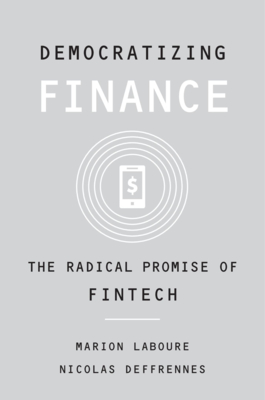Democratizing Finance: The Radical Promise of Fintech

Democratizing Finance: The Radical Promise of Fintech
We are only in the early stages of a broader revolution that will impact every aspect of the global economy, including commerce and government services. Coming financial technology innovations could improve the quality of life for all people.
Over the past few decades, digital technology has transformed finance. Financial technology (fintech) has enabled more people with fewer resources, in more places around the world, to take advantage of banking, insurance, credit, investment, and other financial services. Marion Laboure and Nicolas Deffrennes argue that these changes are only the tip of the iceberg. A much broader revolution is under way that, if steered correctly, will lead to huge and beneficial social change. The authors describe the genesis of recent financial innovations and how they have helped consumers in rich and poor countries alike by reducing costs, increasing accessibility, and improving convenience and efficiency. They connect the dots between early innovations in financial services and the wider revolution unfolding today. Changes may disrupt traditional financial services, especially banking, but they may also help us address major social challenges: opening new career paths for millennials, transforming government services, and expanding the gig economy in developed markets. Fintech could lead to economic infrastructure developments in rural areas and could facilitate emerging social security and healthcare systems in developing countries. The authors make this case with a rich combination of economic theory and case studies, including microanalyses of the effects of fintech innovations on individuals, as well as macroeconomic perspectives on fintech's impact on societies. While celebrating fintech's achievements to date, Laboure and Deffrennes also make recommendations for overcoming the obstacles that remain. The stakes--improved quality of life for all people--could not be higher.PRP: 235.01 Lei
Acesta este Pretul Recomandat de Producator. Pretul de vanzare al produsului este afisat mai jos.
211.51Lei
211.51Lei
235.01 LeiLivrare in 2-4 saptamani
Descrierea produsului
We are only in the early stages of a broader revolution that will impact every aspect of the global economy, including commerce and government services. Coming financial technology innovations could improve the quality of life for all people.
Over the past few decades, digital technology has transformed finance. Financial technology (fintech) has enabled more people with fewer resources, in more places around the world, to take advantage of banking, insurance, credit, investment, and other financial services. Marion Laboure and Nicolas Deffrennes argue that these changes are only the tip of the iceberg. A much broader revolution is under way that, if steered correctly, will lead to huge and beneficial social change. The authors describe the genesis of recent financial innovations and how they have helped consumers in rich and poor countries alike by reducing costs, increasing accessibility, and improving convenience and efficiency. They connect the dots between early innovations in financial services and the wider revolution unfolding today. Changes may disrupt traditional financial services, especially banking, but they may also help us address major social challenges: opening new career paths for millennials, transforming government services, and expanding the gig economy in developed markets. Fintech could lead to economic infrastructure developments in rural areas and could facilitate emerging social security and healthcare systems in developing countries. The authors make this case with a rich combination of economic theory and case studies, including microanalyses of the effects of fintech innovations on individuals, as well as macroeconomic perspectives on fintech's impact on societies. While celebrating fintech's achievements to date, Laboure and Deffrennes also make recommendations for overcoming the obstacles that remain. The stakes--improved quality of life for all people--could not be higher.Detaliile produsului








